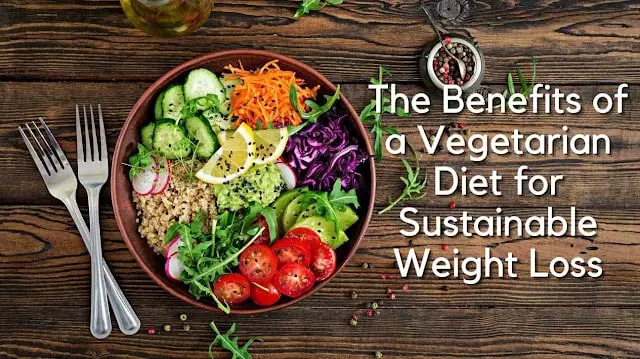The term “Vegetarian Diet” is often associated with a plant-based diet that eliminates meat and fish but still includes dairy and eggs. In recent years, the popularity of a Vegetarian Diet has increased due to its numerous health benefits, including sustainable weight loss. This blog post explores the many advantages of a Vegetarian Diet and how it can lead to sustainable weight loss.
There are many benefits to a Vegetarian Diet that make it a great choice for those looking to lose weight and maintain a healthy lifestyle. The key to a successful weight loss journey is to find a diet that works for you and that you can stick to long-term. For many people, a Vegetarian Diet can solve their weight loss struggles.
By focusing on plant-based foods, a Vegetarian Diet provides a wealth of nutrients and fiber, which can help you feel full and satisfied while reducing your calorie intake. The benefits of a Vegetarian Diet are not just limited to weight loss. It can also improve your overall health and reduce your risk of chronic diseases.
The Advantages of a Vegetarian Diet for Sustainable Weight Loss
One of the key benefits of a Vegetarian Diet is that it can help you achieve sustainable weight loss by reducing your calorie intake. Replacing high-calorie animal products with low-calorie plant-based foods can significantly reduce your overall calorie intake, leading to weight loss.
In addition to reducing calorie intake, the benefits of a Vegetarian Diet also include increased fiber and nutrient intake. Plant-based foods are high in fiber, which helps you feel full and satisfied, reducing the likelihood of overeating. They are also rich in essential nutrients such as vitamins, minerals, and antioxidants, which can help support a healthy metabolism and overall health.
Another benefit of a Vegetarian Diet is its ability to reduce inflammation. Inflammation is linked to many chronic health conditions, including obesity. You can reduce inflammation and support a healthy weight by consuming a diet high in plant-based foods.
Finally, the benefits of a Vegetarian Diet also include better digestion. Plant-based foods are high in fiber, which helps regulate digestion and prevent constipation. It can lead to improved overall digestive health and support sustainable weight loss.
In summary, the benefits of a Vegetarian Diet for sustainable weight loss are numerous and include lower calorie intake, increased fiber and nutrient intake, reduced inflammation, and better digestion. Following a Vegetarian Diet, you can achieve your weight loss goals while improving your overall health and well-being.
The Benefits of a Vegetarian Diet for Long-Term Weight Management
In conclusion, the benefits of a Vegetarian Diet for sustainable weight loss are numerous. By consuming a diet that is lower in calories and rich in fiber, nutrients, and anti-inflammatory foods, you can improve your metabolic health and reduce your risk of chronic diseases, including:
1. Increased satiety
A well-planned Vegetarian Diet can be high in fiber and low in fat, leading to greater feelings of fullness and less likelihood of overeating.
2. Improved metabolic health
Adopting a Vegetarian Diet has been shown to improve insulin sensitivity and reduce inflammation, which can positively affect metabolism and weight management.
3. Reduced risk of chronic diseases
The benefits of a Vegetarian Diet go beyond weight loss, as it can lower the risk of developing heart disease, type 2 diabetes, and certain types of cancer.
4. Better overall health
By focusing on whole, plant-based foods, a Vegetarian Diet provides a variety of vitamins, minerals, and antioxidants necessary for optimal health and well-being. The benefits of a Vegetarian Diet are not limited to weight loss but extend to a healthier, more fulfilling lifestyle.
How to Start a Vegetarian Diet for Sustainable Weight Loss
Starting a vegetarian diet can be a big change, but with a little planning and preparation, it can lead to sustainable weight loss and improved health. Here are some tips to help you get started:
A. Gradual Transition to a Vegetarian Diet: A sudden switch to a vegetarian diet can be overwhelming. Gradually incorporating more plant-based foods into your meals and eventually reducing or eliminating meat can make the transition smoother.
B. Meal Planning and Preparation: Plan your meals and snacks to ensure that you get enough nutrients and variety in your diet. Consider trying new recipes and experimenting with different plant-based foods.
C. Incorporating Variety in Meals: A well-rounded vegetarian diet should include a variety of different plant-based foods to provide a balance of nutrients. Try to include a variety of fruits, vegetables, whole grains, legumes, and nuts in your meals.
D. Supplementation to Meet Nutrient Needs: Certain nutrients, such as vitamin B12, iron, and omega-3 fatty acids, are more challenging to get from a vegetarian diet. Consider taking a multivitamin or a B12 supplement and eating iron-rich foods, like leafy greens, and omega-3-rich foods, like flaxseeds and chia seeds, to meet these nutrient needs.
By following these tips, you can reap the benefits of a vegetarian diet and achieve sustainable weight loss. Check also Vegetarian Diet Plan for Weight Loss.
Common Concerns about a Vegetarian Diet and How to Address Them
A. Meeting protein needs
Starting a vegetarian diet can raise concerns about not getting enough protein. However, plenty of plant-based protein sources such as beans, lentils, tofu, tempeh, and nuts can provide enough protein for a healthy diet. It’s also important to ensure that a variety of protein sources are included in meals to ensure adequate amino acid intake.
B. Staying full and satisfied
One of the biggest concerns people have about switching to a vegetarian diet is that they will need more time to feel full and satisfied. It is where the high fiber content of plant-based foods comes in handy, as fiber helps keep us feeling full for longer periods. Including high-protein, high-fiber foods such as lentils, beans, and whole grains in meals can help keep hunger at bay.
C. Getting enough essential nutrients
A well-planned vegetarian diet can provide all the vital nutrients required for good health, including iron, calcium, and B vitamins. However, it is important to be mindful of nutrient intake and incorporate various nutrient-dense foods into the diet. For example, incorporating leafy greens for iron, dairy alternatives for calcium, and fortified cereals for B vitamins. Taking a daily multivitamin can also help ensure adequate nutrient intake.
Conclusion
the benefits of a Vegetarian Diet for sustainable weight loss are numerous. By consuming a diet that is lower in calories and rich in fiber, nutrients, and anti-inflammatory foods, you can improve your metabolic health and reduce your risk of chronic diseases.
Additionally, a vegetarian diet can increase satiety, making it easier to stick to your weight loss goals. If you’re considering a vegetarian diet, it’s important to make the transition gradually and plan your meals carefully to ensure that you’re meeting all your nutrient needs. Common concerns about a vegetarian diet, such as getting enough protein and staying full, can be addressed with careful meal planning and supplementation.
So if you’re looking for a way to achieve sustainable weight loss and improve your overall health, the benefits of a Vegetarian Diet may be worth considering. Remember that a balanced and nutrient-dense diet is essential for long-term health, regardless of whether it is vegetarian.












